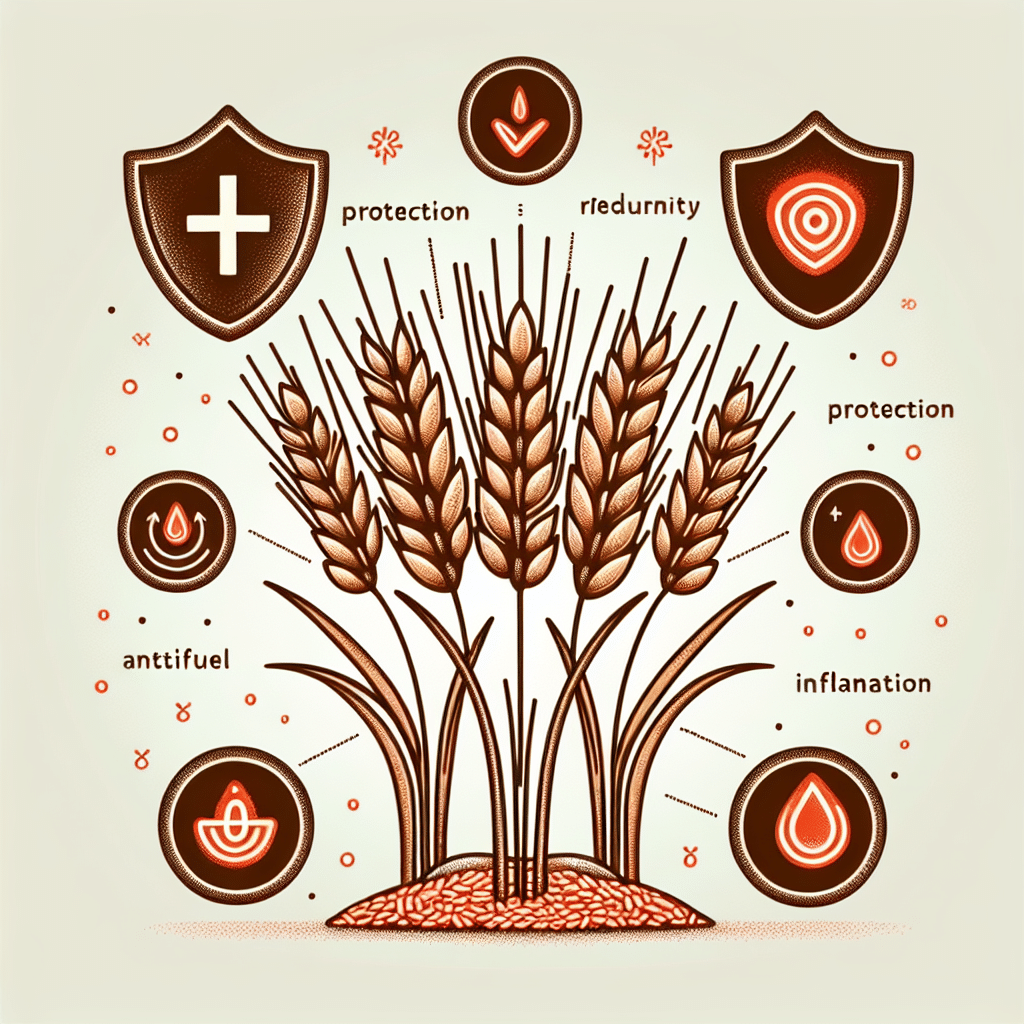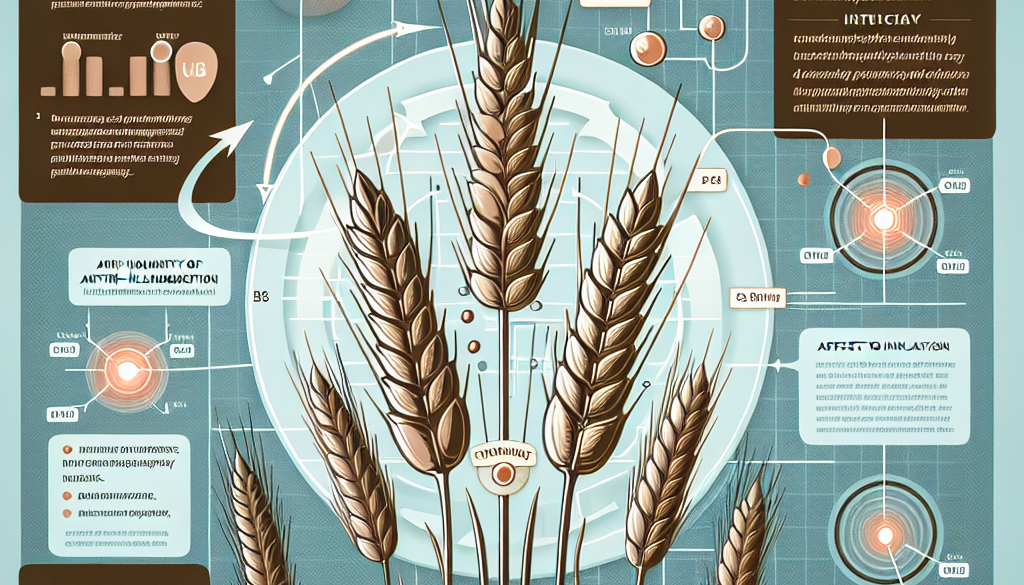Is Rye Anti-Inflammatory?
-
Table of Contents
- Is Rye Anti-Inflammatory? Exploring the Health Benefits
- Understanding Inflammation and Its Impact on Health
- The Nutritional Profile of Rye
- Rye’s Anti-Inflammatory Properties
- Scientific Research on Rye and Inflammation
- Case Studies and Anecdotal Evidence
- Comparing Rye to Other Whole Grains
- Incorporating Rye into Your Diet
- Conclusion: Rye as a Part of an Anti-Inflammatory Diet
- Discover ETprotein’s High-Quality Protein Products
Is Rye Anti-Inflammatory? Exploring the Health Benefits

In the quest for healthier dietary choices, whole grains like rye have garnered attention for their potential health benefits. Among these, the anti-inflammatory properties of rye are of particular interest to nutritionists and health-conscious individuals alike. Inflammation is a natural process in the body, but chronic inflammation can lead to various diseases, including heart disease, diabetes, and arthritis. Therefore, incorporating anti-inflammatory foods into one’s diet is a proactive approach to maintaining good health. This article delves into the question: Is rye anti-inflammatory?
Understanding Inflammation and Its Impact on Health
Inflammation is the body’s response to injury or infection, a defense mechanism that signals the immune system to heal and repair damaged tissue, as well as defend against foreign invaders like viruses and bacteria. However, when inflammation persists over time, it can become chronic and contribute to the development of several diseases.
The Nutritional Profile of Rye
Rye is a cereal grain that is closely related to wheat and barley. It is a rich source of essential nutrients, including:
- Dietary fiber
- Vitamins, such as B vitamins and vitamin E
- Minerals, including magnesium, phosphorus, and zinc
- Phytonutrients, such as lignans and phenolic acids
- Antioxidants
These components contribute to rye’s potential health benefits, including its anti-inflammatory properties.
Rye’s Anti-Inflammatory Properties
Several studies have suggested that rye may have anti-inflammatory effects. The dietary fiber in rye, particularly arabinoxylan and beta-glucan, is known to promote gut health and reduce inflammatory markers. Additionally, the antioxidants present in rye, such as phenolic acids, can neutralize free radicals, thereby reducing oxidative stress and inflammation.
Scientific Research on Rye and Inflammation
Research has shown that whole grain consumption is associated with lower levels of inflammation. A study published in the American Journal of Clinical Nutrition found that individuals who consumed whole grains, including rye, had lower concentrations of inflammatory markers such as C-reactive protein (CRP).
Another study in the Journal of Nutrition reported that rye bread consumption reduced the postprandial insulin response and appeared to have beneficial effects on the inflammatory profile in subjects with metabolic syndrome, a cluster of conditions that increase the risk of heart disease and diabetes.
Case Studies and Anecdotal Evidence
While clinical studies are essential for understanding the health benefits of rye, anecdotal evidence from populations that consume rye as a staple also supports its anti-inflammatory potential. For example, in Scandinavian countries, where rye bread is a dietary mainstay, there is a lower prevalence of certain inflammatory diseases.
Comparing Rye to Other Whole Grains
When compared to other whole grains, rye stands out for its high fiber content and unique composition of bioactive compounds. While all whole grains are beneficial for health and can contribute to reducing inflammation, rye’s specific nutrients and phytochemicals may give it an edge in combating inflammatory processes.
Incorporating Rye into Your Diet
Adding rye to your diet is a simple way to take advantage of its potential anti-inflammatory benefits. Here are some suggestions:
- Switch from white bread to whole grain rye bread.
- Use rye flakes as a breakfast cereal or in baking.
- Include rye berries in soups, stews, or salads.
- Experiment with rye flour in your recipes for pancakes, muffins, and other baked goods.
Conclusion: Rye as a Part of an Anti-Inflammatory Diet
In conclusion, the evidence suggests that rye may indeed have anti-inflammatory properties, making it a valuable addition to an anti-inflammatory diet. Its rich nutritional profile, including dietary fiber, vitamins, minerals, and antioxidants, contributes to its health benefits. By incorporating rye into your diet, you can potentially reduce inflammation and improve overall health.
Discover ETprotein’s High-Quality Protein Products
If you’re looking to enhance your diet with protein-rich foods, consider ETprotein’s range of organic bulk vegan proteins. Their products, including organic rice protein and pea protein, are characterized by a neutral taste, non-GMO, and allergen-free attributes. With L-(+)-Ergothioneine purity over 98%, ETprotein’s offerings cater to a diverse range of industries and dietary needs.
Whether you’re involved in sports nutrition, weight management, dietary supplements, or simply seeking to improve your health and wellness, ETprotein provides comprehensive solutions to meet all your protein needs. Their commitment to quality and customer satisfaction makes them a trusted supplier for leading global brands.
For more information or to sample their products, please contact ETprotein and email sales(at)ETprotein.com today.
About ETprotein:
ETprotein, a reputable protein and L-(+)-Ergothioneine (EGT) Chinese factory manufacturer and supplier, is renowned for producing, stocking, exporting, and delivering the highest quality organic bulk vegan proteins and L-(+)-Ergothioneine. They include Organic rice protein, clear rice protein, pea protein, clear pea protein, watermelon seed protein, pumpkin seed protein, sunflower seed protein, mung bean protein, peanut protein, and L-(+)-Ergothioneine EGT Pharmaceutical grade, L-(+)-Ergothioneine EGT food grade, L-(+)-Ergothioneine EGT cosmetic grade, L-(+)-Ergothioneine EGT reference grade and L-(+)-Ergothioneine EGT standard. Their offerings, characterized by a neutral taste, non-GMO, allergen-free attributes, with L-(+)-Ergothioneine purity over 98%, 99%, cater to a diverse range of industries. They serve nutraceutical, pharmaceutical, cosmeceutical, veterinary, as well as food and beverage finished product distributors, traders, and manufacturers across Europe, USA, Canada, Australia, Thailand, Japan, Korea, Brazil, and Chile, among others.
ETprotein specialization includes exporting and delivering tailor-made protein powder and finished nutritional supplements. Their extensive product range covers sectors like Food and Beverage, Sports Nutrition, Weight Management, Dietary Supplements, Health and Wellness Products, and Infant Formula, ensuring comprehensive solutions to meet all your protein needs.
As a trusted company by leading global food and beverage brands and Fortune 500 companies, ETprotein reinforces China’s reputation in the global arena. For more information or to sample their products, please contact them and email sales(at)ETprotein.com today.












